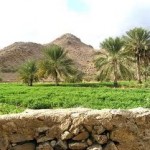Environmental Visionaries: The Diaper Farmer
from POPULAR SCIENCE, July, 2010
When asked to imagine the Earth in 2040, many scientists describe a grim scenario, a landscape so bare and dry, it’s almost uninhabitable. But that’s not what Willem van Cotthem sees. “It will be a green world,” says van Cotthem, a Belgian scientist turned social entrepreneur. “Tropical fruit can grow wherever it’s warm.” You still need water, but not much. A brief splash of rain every once in a while is enough. And voilà—from sandy soil, lush gardens grow.
The secret is hydrogels, powerfully absorbent polymers that can suck up hundreds of times their weight in water.
Hydrogels have many applications today, from food processing to mopping up oil spills, but they are most familiar as the magic ingredient in disposable diapers. The difference with agricultural hydrogels is that they don’t just trap moisture; they let it go again, very slowly, almost like time-release medication, into the root system of plants. That continuity of moisture is what brittle landscapes like deserts need to become fertile again. Water activates a mineralization process, order tramadol pay cod setting free nutrients in the soil so that life can grow.
But water alone won’t make gardens flourish in sand. So van Cotthem, an honorary professor of botany at Ghent University in Belgium who has helmed several international scientific panels studying desertification, invented a “soil conditioner” called Terracottem. It’s an 8- to 12-inch layer of dirt impregnated with hydrogels, along with organic agents that nourish the natural bacteria in the soil.
Van Cotthem’s early experiments with his soil are now literally bearing fruit on every continent except Antarctica. Where Terracottem sits, barren plots of land are now fertile, and have already changed lives. In 2005, UNICEF invited van Cotthem to oversee the construction of “family gardens” in the Sahawari refugee camps in Algeria. Since 1975, thousands of Africans in the camps have lived in tents and shacks, dependent on the World Food Program to provide them with dry and canned goods—a diet that left them vulnerable to disease. Today more than 2,000 pocket gardens there provide healthy food.
Read the rest of the article at:
www.popsci.com/science/article/2010-06/environmental-visionaries-diaper-farmer
